formerly eScholarship Editions


|
|
|
|
Your search for
'Anthropology' in subject
found 300 book(s). | Modify Search | Displaying 221 - 240 of 300 book(s) | |
| 221. | 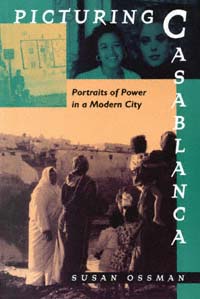 | Title: Picturing Casablanca: portraits of power in a modern city Author: Ossman, Susan Published: University of California Press, 1994 Subjects: Anthropology | Postcolonial Studies | Middle Eastern Studies | Electronic Media | Media Studies Publisher's Description: In Picturing Casablanca , Susan Ossman probes the shape and texture of mass images in Casablanca, from posters, films, and videotapes to elections, staged political spectacles, and changing rituals. In a fluid style that blends ethnographic narrative, cultural reportage, and the author's firsthand experiences, Ossman sketches a radically new vision of Casablanca as a place where social practices, traditions, and structures of power are in flux.Ossman guides the reader through the labyrinthine byways of the city, where state bureaucracy and state power, the media and its portrayal of the outside world, and people's everyday lives are all on view. She demonstrates how images not only reflect but inform and alter daily experience. In the Arab League Park, teenagers use fashion and flirting to attract potential mates, defying traditional rules of conduct. Wedding ceremonies are transformed by the ubiquitous video camera, which becomes the event's most important spectator. Political leaders are molded by the state's adept manipulation of visual media.From Madonna videos and the TV's transformation of social time, to changing gender roles and new ways of producing and disseminating information, the Morocco that Ossman reveals is a telling commentary on the consequences of colonial planning, the influence of modern media, and the rituals of power and representation enacted by the state. [brief] Similar Items |
| 222. | 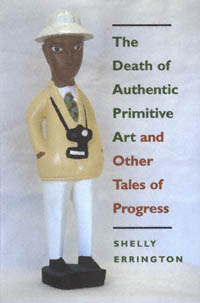 | Title: The death of authentic primitive art and other tales of progress Author: Errington, Shelly 1944- Published: University of California Press, 1998 Subjects: Anthropology | Cultural Anthropology | Art History | Architectural History | Art Theory Publisher's Description: In this lucid, witty, and forceful book, Shelly Errington argues that Primitive Art was invented as a new type of art object at the beginning of the twentieth century but that now, at the century's end, it has died a double but contradictory death. Authenticity and primitivism, both attacked by cultural critics, have died as concepts. At the same time, the penetration of nation-states, the tourist industry, and transnational corporations into regions that formerly produced these artifacts has severely reduced supplies of "primitive art," bringing about a second "death."Errington argues that the construction of the primitive in the nineteenth and twentieth centuries (and the kinds of objects chosen to exemplify it) must be understood as a product of discourses of progress - from the nineteenth-century European narrative of technological progress, to the twentieth-century narrative of modernism, to the late- twentieth-century narrative of the triumph of the free market. In Part One she charts a provocative argument ranging through the worlds of museums, art theorists, mail-order catalogs, boutiques, tourism, and world events, tracing a loosely historical account of the transformations of meanings of primitive art in this century. In Part Two she explores an eclectic collection of public sites in Mexico and Indonesia - a national museum of anthropology, a cultural theme park, an airport, and a ninth-century Buddhist monument (newly refurbished) - to show how the idea of the primitive can be used in the interests of promoting nationalism and economic development.Errington's dissection of discourses about progress and primitivism in the contemporary world is both a lively introduction to anthropological studies of art institutions and a dramatic new contribution to the growing field of cultural studies. [brief] Similar Items |
| 223. | 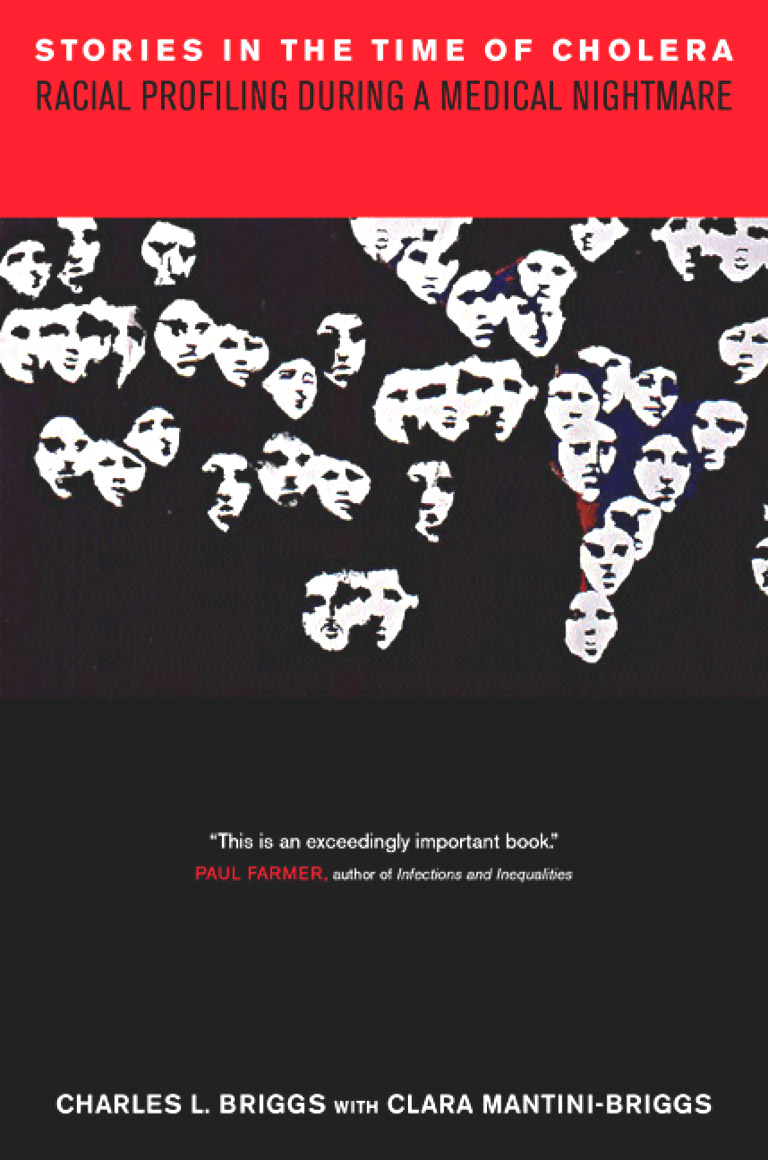 | Title: Stories in the time of cholera: racial profiling during a medical nightmare Author: Briggs, Charles L 1953- Published: University of California Press, 2003 Subjects: Anthropology | Latin American Studies | Ethnic Studies | Disease | Medical Anthropology Publisher's Description: Cholera, although it can kill an adult through dehydration in half a day, is easily treated. Yet in 1992-93, some five hundred people died from cholera in the Orinoco Delta of eastern Venezuela. In some communities, a third of the adults died in a single night, as anthropologist Charles Briggs and Clara Mantini-Briggs, a Venezuelan public health physician, reveal in their frontline report. Why, they ask in this moving and thought-provoking account, did so many die near the end of the twentieth century from a bacterial infection associated with the premodern past? It was evident that the number of deaths resulted not only from inadequacies in medical services but also from the failure of public health officials to inform residents that cholera was likely to arrive. Less evident were the ways that scientists, officials, and politicians connected representations of infectious diseases with images of social inequality. In Venezuela, cholera was racialized as officials used anthropological notions of "culture" in deflecting blame away from their institutions and onto the victims themselves. The disease, the space of the Orinoco Delta, and the "indigenous ethnic group" who suffered cholera all came to seem somehow synonymous. One of the major threats to people's health worldwide is this deadly cycle of passing the blame. Carefully documenting how stigma, stories, and statistics circulate across borders, this first-rate ethnography demonstrates that the process undermines all the efforts of physicians and public health officials and at the same time contributes catastrophically to epidemics not only of cholera but also of tuberculosis, malaria, AIDS, and other killers. The authors have harnessed their own outrage over what took place during the epidemic and its aftermath in order to make clear the political and human stakes involved in the circulation of narratives, resources, and germs. [brief] Similar Items |
| 224. | 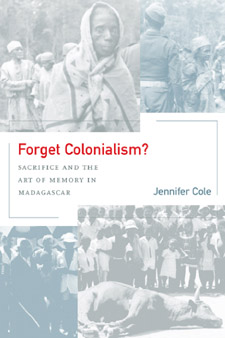 | Title: Forget colonialism?: sacrifice and the art of memory in Madagascar Author: Cole, Jennifer 1966- Published: University of California Press, 2001 Subjects: Anthropology | African Studies | Geography | African History | Cultural Anthropology | Postcolonial Studies Publisher's Description: While doing fieldwork in a village in east Madagascar that had suffered both heavy settler colonialism and a bloody anticolonial rebellion, Jennifer Cole found herself confronted by a puzzle. People in the area had lived through almost a century of intrusive French colonial rule, but they appeared to have forgotten the colonial period in their daily lives. Then, during democratic elections in 1992-93, the terrifying memories came flooding back. Cole asks, How do once-colonized peoples remember the colonial period? Drawing on a fine-grained ethnography of the social practices of remembering and forgetting in one community, she develops a practice-based approach to social memory. [brief] Similar Items |
| 225. |  | Title: Where the world ended: re-unification and identity in the German borderland Author: Berdahl, Daphne 1964- Published: University of California Press, 1999 Subjects: Anthropology | Cultural Anthropology | German Studies | Geography | European Studies | Social Problems Publisher's Description: When the Berlin Wall fell, people who lived along the dismantled border found their lives drastically and rapidly transformed. Daphne Berdahl, through ongoing ethnographic research in a former East German border village, explores the issues of borders and borderland identities that have accompanied the many transitions since 1990. What happens to identity and personhood, she asks, when a political and economic system collapses overnight? How do people negotiate and manipulate a liminal condition created by the disappearance of a significant frame of reference?Berdahl concentrates especially on how these changes have affected certain "border zones" of daily life - including social organization, gender, religion, and nationality - in a place where literal, indeed concrete, borders were until recently a very powerful presence. Borders, she argues, are places of ambiguity as well as of intense lucidity; these qualities may in fact be mutually constitutive. She shows how, in a moment of headlong historical transformation, larger political, economic, and social processes are manifested locally and specifically. In the process of a transition between two German states, people have invented, and to some extent ritualized, cultural practices that both reflect and constitute profound identity transformations in a period of intense social discord. Where the World Ended combines a vivid ethnographic account of everyday life under socialist rule and after German reunification with an original investigation of the paradoxical human condition of a borderland. [brief] Similar Items |
| 226. | 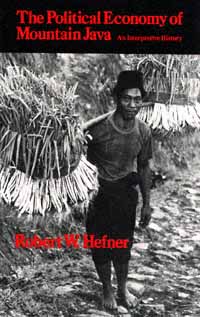 | Title: The political economy of mountain Java: an interpretive history Author: Hefner, Robert W 1952- Published: University of California Press, 1990 Subjects: Anthropology | Asian History | Sociology | Cultural Anthropology | Southeast Asia | Politics Similar Items |
| 227. | 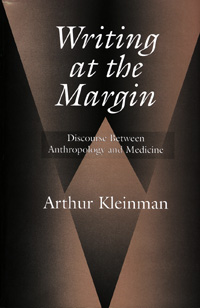 | Title: Writing at the margin: discourse between anthropology and medicine Author: Kleinman, Arthur Published: University of California Press, 1997 Subjects: Anthropology | Medical Anthropology | Sociology | Medicine | Asian Studies | Social Problems Publisher's Description: One of the most influential and creative scholars in medical anthropology takes stock of his recent intellectual odysseys in this collection of essays. Arthur Kleinman, an anthropologist and psychiatrist who has studied in Taiwan, China, and North America since 1968, draws upon his bicultural, multidisciplinary background to propose alternative strategies for thinking about how, in the postmodern world, the social and medical relate. Writing at the Margin explores the border between medical and social problems, the boundary between health and social change. Kleinman studies the body as the mediator between individual and collective experience, finding that many health problems - for example the trauma of violence or depression in the course of chronic pain - are less individual medical problems than interpersonal experiences of social suffering. He argues for an ethnographic approach to moral practice in medicine, one that embraces the infrapolitical context of illness, the responses to it, the social institutions relating to it, and the way it is configured in medical ethics.Previously published in various journals, these essays have been revised, updated, and brought together with an introduction, an essay on violence and the politics of post-traumatic stress disorder, and a new chapter that examines the contemporary ethnographic literature of medical anthropology. [brief] Similar Items |
| 228. | 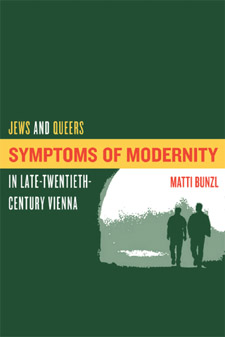 | Title: Symptoms of modernity: Jews and queers in late-twentieth-century Vienna Author: Bunzl, Matti 1971- Published: University of California Press, 2004 Subjects: Anthropology | Jewish Studies | European History | Sociology | GayLesbian and Bisexual Studies Publisher's Description: In the 1990s, Vienna's Jews and queers abandoned their clandestine existence and emerged into the city's public sphere in unprecedented numbers. Symptoms of Modernity traces this development in the context of Central European history. Jews and homosexuals are signposts of an exclusionary process of nation-building. Cast in their modern roles in the late nineteenth century, they functioned as Others, allowing a national community to imagine itself as a site of ethnic and sexual purity. In Matti Bunzl's incisive historical and cultural analysis, the Holocaust appears as the catastrophic culmination of this violent project, an attempt to eradicate modernity's abject by-products from the body politic. As Symptoms of Modernity shows, though World War II brought an end to the genocidal persecution, the nation's exclusionary logic persisted, accounting for the ongoing marginalization of Jews and homosexuals. Not until the 1970s did individual Jews and queers begin to challenge the hegemonic subordination - a resistance that, by the 1990s, was joined by the state's attempts to ensure and affirm the continued presence of Jews and queers. Symptoms of Modernity gives an account of this radical cultural reversal, linking it to geopolitical transformations and to the supersession of the European nation-state by a postmodern polity. [brief] Similar Items |
| 229. |  | Title: Warriors into traders: the power of the market in early Greece Author: Tandy, David W Published: University of California Press, 1997 Subjects: Classics | Ancient History | Classical History | Economics and Business | Anthropology | Politics Publisher's Description: The eighth century dawned on a Greek world that had remained substantially unchanged during the centuries of stagnation known as the Dark Age. This book is a study of the economic and cultural upheaval that shook mainland Greece and the Aegean area in the eighth century, and the role that poetry played in this upheaval. Using tools from political and economic anthropology, David Tandy argues that between about 800 and 700 B.C., a great transformation of dominant economic institutions took place involving wrenching adjustments in the way status and wealth were distributed within the Greek communities.Tandy explores the economic organization of preindustrial societies, both ancient and contemporary, to shed light on the Greek experience. He argues that the sudden shift in Greek economic formations led to new social behaviors and to new social structures such as the polis , itself a by-product of economic change. Unraveling the dialectic between the material record and epic poetry, Tandy shows that the epic tradition mirrored these new social behaviors and that it portrayed the stresses that economic change brought to the ancient Aegean world.Tandy brings in comparative evidence from other small-scale communities beset by changes, spotlighting the specific plight of one community, Ascra in Boeotia, on whose behalf Hesiod sang his Works and Days . The result is a lively, moving account of a human dilemma that, many centuries later, is all too familiar. [brief] Similar Items |
| 230. | 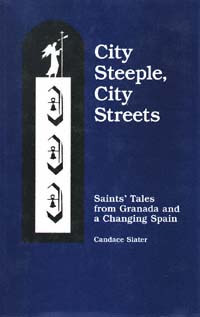 | Title: City steeple, city streets: saints' tales from Granada and a changing Spain Author: Slater, Candace Published: University of California Press, 1990 Subjects: Anthropology | Folklore and Mythology | Literary Theory and Criticism | European Literature Publisher's Description: Candace Slater's new book focuses on narratives concerning Fray Leopoldo de Alpandeire (1864-1956), a Capuchin friar from Granada and probably the most popular nonconsecrated saint today in all of Spain. In tracing the emergence of a group of contemporary legends about Fray Leopoldo, Slater discusses both the stories she tape-recorded in the streets of Granada and the friar's official biography. She underscores the essential pluralism of the tales, their undercurrent of resistance to institutional authority, and their deep concern for the relationship between past and present. Bearing witness to the subtlety and resilience of even the most apparently conservative folk-literary forms, these stories are not only about the role of saints and miracles in an increasingly secular and industrial society but, first and foremost, also about the legacy of the Franco years. [brief] Similar Items |
| 231. | 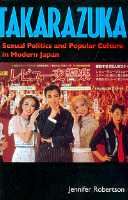 | Title: Takarazuka: sexual politics and popular culture in modern Japan Author: Robertson, Jennifer Ellen Published: University of California Press, 1998 Subjects: Anthropology | Japan | Cultural Anthropology | GayLesbian and Bisexual Studies | Women's Studies | Theatre | Popular Culture Publisher's Description: The all-female Takarazuka Revue is world-famous today for its rococo musical productions, including gender-bending love stories, torridly romantic liaisons in foreign settings, and fanatically devoted fans. But that is only a small part of its complicated and complicit performance history. In this sophisticated and historically grounded analysis, anthropologist Jennifer Robertson draws from over a decade of fieldwork and archival research to explore how the Revue illuminates discourses of sexual politics, nationalism, imperialism, and popular culture in twentieth-century Japan.The Revue was founded in 1913 as a novel counterpart to the all-male Kabuki theater. Tracing the contradictory meanings of Takarazuka productions over time, with special attention to the World War II period, Robertson illuminates the intricate web of relationships among managers, directors, actors, fans, and social critics, whose clashes and compromises textured the theater and the wider society in colorful and complex ways. Using Takarazuka as a key to understanding the "logic" of everyday life in Japan and placing the Revue squarely in its own social, historical, and cultural context, she challenges both the stereotypes of "the Japanese" and the Eurocentric notions of gender performance and sexuality. [brief] Similar Items |
| 232. |  | Title: Buddha is hiding: refugees, citizenship, the new America Author: Ong, Aihwa Published: University of California Press, 2003 Subjects: Anthropology | American Studies | Asian American Studies | Gender Studies | Urban Studies | Sociology | Immigration Publisher's Description: Fleeing the murderous Pol Pot regime, Cambodian refugees arrive in America as at once the victims and the heroes of America's misadventures in Southeast Asia; and their encounters with American citizenship are contradictory as well. Service providers, bureaucrats, and employers exhort them to be self-reliant, individualistic, and free, even as the system and the culture constrain them within terms of ethnicity, race, and class. Buddha Is Hiding tells the story of Cambodian Americans experiencing American citizenship from the bottom-up. Based on extensive fieldwork in Oakland and San Francisco, the study puts a human face on how American institutions - of health, welfare, law, police, church, and industry - affect minority citizens as they negotiate American culture and re-interpret the American dream. In her earlier book, Flexible Citizenship, anthropologist Aihwa Ong wrote of elite Asians shuttling across the Pacific. This parallel study tells the very different story of "the other Asians" whose route takes them from refugee camps to California's inner-city and high-tech enclaves. In Buddha Is Hiding we see these refugees becoming new citizen-subjects through a dual process of being-made and self-making, balancing religious salvation and entrepreneurial values as they endure and undermine, absorb and deflect conflicting lessons about welfare, work, medicine, gender, parenting, and mass culture. Trying to hold on to the values of family and home culture, Cambodian Americans nonetheless often feel that "Buddha is hiding." Tracing the entangled paths of poor and rich Asians in the American nation, Ong raises new questions about the form and meaning of citizenship in an era of globalization. [brief] Similar Items |
| 233. |  | Title: Inside the American couple: new thinking/new challenges Author: Yalom, Marilyn Published: University of California Press, 2002 Subjects: Sociology | Anthropology | Ethnic Studies | GayLesbian and Bisexual Studies | Women's Studies | Women's Studies | Women's Studies Publisher's Description: One of the most fundamental human urges is to form a pair. Despite many tendencies that threaten traditional marriage and even make committed cohabitation problematic, very few people live through adulthood without at least one lengthy relationship, and up to ninety percent of Americans marry at least once in their lives. This pioneering volume draws attention to issues that question the unspoken traditional practices underlying coupling in America. In it, some of today's most innovative feminist scholars consider the dramatic changes couples have experienced over the past fifty years, such as the proliferation of divorce, the increase in ethnically-mixed relationships, the preponderance of older couples, and the new visibility of same-sex unions. Approaching their subject from a range of disciplines, the authors explore the couple as an enduring paradigm for human relationships, despite the changes in ideology and practice that couples have experienced over time. The essays delve into such subjects as the historical roots of modern marriage, the recent phenomenon of lesbian and gay commitment ceremonies, the home as a workplace and a place of refuge, and the stresses that turn a happy marriage into an unhappy one. One chapter explodes the myth that feminists are responsible for the high incidence of divorce, while another focuses on the financial worth of the wife after the demise of a long-standing marriage. Taken together, these essays impart a deep and complex picture of the challenges facing couples in our time. The vital and engaging narratives show that however anxious our society may be in the face of dissolving marriages and dysfunctional families, couples will continue to form the bedrock of American society in the twenty-first century. [brief] Similar Items |
| 234. | 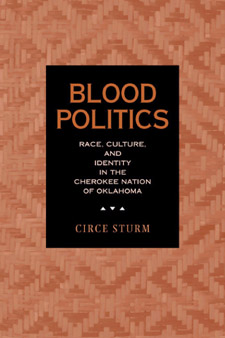 | Title: Blood politics: race, culture, and identity in the Cherokee Nation of Oklahoma Author: Sturm, Circe 1967- Published: University of California Press, 2002 Subjects: Anthropology | Cultural Anthropology | Native American Studies | Native American Ethnicity | African American Studies Publisher's Description: Circe Sturm takes a bold and original approach to one of the most highly charged and important issues in the United States today: race and national identity. Focusing on the Oklahoma Cherokee, she examines how Cherokee identity is socially and politically constructed, and how that process is embedded in ideas of blood, color, and race. Not quite a century ago, blood degree varied among Cherokee citizens from full blood to 1/256, but today the range is far greater--from full blood to 1/2048. This trend raises questions about the symbolic significance of blood and the degree to which blood connections can stretch and still carry a sense of legitimacy. It also raises questions about how much racial blending can occur before Cherokees cease to be identified as a distinct people and what danger is posed to Cherokee sovereignty if the federal government continues to identify Cherokees and other Native Americans on a racial basis. Combining contemporary ethnography and ethnohistory, Sturm's sophisticated and insightful analysis probes the intersection of race and national identity, the process of nation formation, and the dangers in linking racial and national identities. [brief] Similar Items |
| 235. | 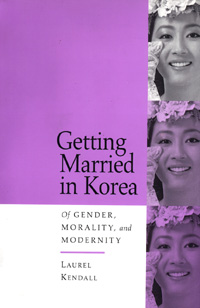 | Title: Getting married in Korea: of gender, morality, and modernity Author: Kendall, Laurel Published: University of California Press, 1996 Subjects: Anthropology | Cultural Anthropology | East Asia Other | Women's Studies | Men and Masculinity Similar Items |
| 236. | 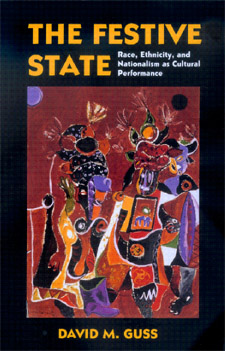 | Title: The festive state: race, ethnicity, and nationalism as cultural performance Author: Guss, David M Published: University of California Press, 2001 Subjects: Anthropology | Latin American Studies | Ethnic Studies | Cultural Anthropology | Sociology | Popular Culture Publisher's Description: If, as David Guss argues, culture is a contested terrain with constantly changing contours, then festivals are its battlegrounds, where people come to fight and dispute in large acts of public display. Festive behavior, long seen by anthropologists and folklorists as the "uniform expression of a collective consciousness, is contentious and often subversive," and The Festive State is an eye-opening guide to its workings. Guss investigates "the ideology of tradition," combining four case studies in a radical multisite ethnography to demonstrate how in each instance concepts of race, ethnicity, history, gender, and nationhood are challenged and redefined. In a narrative as colorful as the events themselves, Guss presents the Afro-Venezuelan celebration of San Juan, the "neo-Indian" Day of the Monkey, the mestizo ritual of Tamunangue, and the cultural policies and products of a British multinational tobacco corporation. All these illustrate the remarkable fluidity of festive behavior as well as its importance in articulating different cultural interests. [brief] Similar Items |
| 237. |  | Title: Hey, waitress!: the USA from the other side of the tray Author: Owings, Alison Published: University of California Press, 2002 Subjects: Sociology | Anthropology | United States History | Sociology | Labor Studies | American Studies | Women's Studies Publisher's Description: Most of us have sat across the tray from a waitress, but how many of us know what really is going on from her side? Hey, Waitress! aims to tell us. Containing lively, personal portraits of waitresses from many different walks of life, this book is the first of its kind to show the intimate, illuminating, and often shocking behind-the-scenes stories of waitresses' daily shifts and daily lives. Alison Owings traveled the country - from border to border and coast to coast - to hear firsthand what waitresses think about their lives, their work, and their world. Part journalism and part oral history, Hey, Waitress! introduces an eclectic cast of characters: a ninety-five-year-old Baltimore woman who may have been the oldest living waitress, a Staten Island firebrand laboring at a Pizza Hut, a well-to-do runaway housewife, a Native American proud of her financial independence, a college student loving her diner more than her studies, a Cajun grandmother of twenty-two, and many others. The book also offers vivid slices of American history. The stories describe the famous sit-in at the Woolworth's counter in Greensboro, North Carolina, which helped spark the civil rights movement; early struggles for waitress unions; and battles against sexually discriminatory hiring in restaurants. A superb and accessible means of breaking down stereotypes, this book reveals American waitresses in all their complexity and individuality, and will surely change the way we order, tip, and, most of all, behave in restaurants. [brief] Similar Items |
| 238. |  | Title: Envisioning power: ideologies of dominance and crisis Author: Wolf, Eric R 1923- Published: University of California Press, 1999 Subjects: Anthropology | Social Theory | Social and Political Thought | Political Theory | Intellectual History Publisher's Description: With the originality and energy that have marked his earlier works, Eric Wolf now explores the historical relationship of ideas, power, and culture. Responding to anthropology's long reliance on a concept of culture that takes little account of power, Wolf argues that power is crucial in shaping the circumstances of cultural production. Responding to social-science notions of ideology that incorporate power but disregard the ways ideas respond to cultural promptings, he demonstrates how power and ideas connect through the medium of culture.Wolf advances his argument by examining three very different societies, each remarkable for its flamboyant ideological expressions: the Kwakiutl Indians of the Northwest Pacific Coast, the Aztecs of pre-Hispanic Mexico, and National Socialist Germany. Tracing the history of each case, he shows how these societies faced tensions posed by ecological, social, political, or psychological crises, prompting ideological responses that drew on distinctive, historically rooted cultural understandings. In each case study, Wolf analyzes how the regnant ideology intertwines with power around the pivotal relationships that govern social labor. Anyone interested in the history of anthropology or in how the social sciences make comparisons will want to join Wolf in Envisioning Power . [brief] Similar Items |
| 239. | 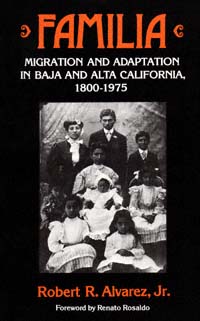 | Title: Familia: migration and adaptation in Baja and Alta California, 1800-1975 Author: Alvarez, Robert R Published: University of California Press, 1987 Subjects: Anthropology | Cultural Anthropology | Demography | Latin American History | Latin American Studies | Postcolonial Studies Publisher's Description: Anthropologists, historians, and sociologists will find here a striking challenge to accepted explanations of the northward movement of migrants from Mexico into the United States. Alvarez investigates the life histories of pioneer migrants and their offspring, finding a human dimension to migration which centers on the family. Spanish, American, and English exploits paved the way for exchange between Baja and Alta California. Alvarez shows how cultural stability actually increased as migrants settled in new locations, bringing their common values and memories with them. [brief] Similar Items |
| 240. | 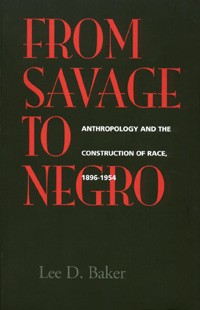 | Title: From savage to Negro: anthropology and the construction of race, 1896-1954 Author: Baker, Lee D 1966- Published: University of California Press, 1998 Subjects: Anthropology | Cultural Anthropology | Ethnic Studies | African American Studies | United States History | Sociology Publisher's Description: Lee D. Baker explores what racial categories mean to the American public and how these meanings are reinforced by anthropology, popular culture, and the law. Focusing on the period between two landmark Supreme Court decisions - Plessy v. Ferguson (the so-called "separate but equal" doctrine established in 1896) and Brown v. Board of Education (the public school desegregation decision of 1954) - Baker shows how racial categories change over time.Baker paints a vivid picture of the relationships between specific African American and white scholars, who orchestrated a paradigm shift within the social sciences from ideas based on Social Darwinism to those based on cultural relativism. He demonstrates that the greatest impact on the way the law codifies racial differences has been made by organizations such as the NAACP, which skillfully appropriated the new social science to exploit the politics of the Cold War. [brief] Similar Items |